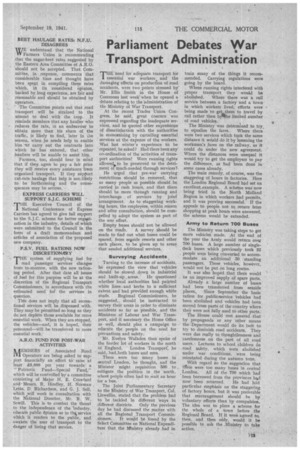Parliament Debates War Transport Administration
Page 17

If you've noticed an error in this article please click here to report it so we can fix it.
THE 'need for adequate transport for essential war workers and the damaging effects on productIon of road accidents, were two points stressed by Mr. Ellis Smith in the House of Commons last week when he opened a debate relating to the administration of the Ministry of War Transport.
At the recent Trades Union Congress. he said, great concern was expressed regarding the inadequate services, and he quoted other expreesious of dissatisfaction with the authorities in econornizing by curtailing essential services at the expense of the workers. Was last winter's experience to be repeated, he asked? Had there been any co-ordination of the activities of transport authorities? Were running rights' allowed to be preserved to the detriment of-much-needed through services?.
He urged that pre-war carrying restrictions should be removed, that as many people as possible should be carried in rush hours, and that there should be more through running and interchange of services by joinf arrangement. As to staggering work. lag hours, the employers, within reason and after consultation, should be compelled to adopt the system as part of the war effort.
Empty buses should notbe allowed
on the roads. A survey should be made to find out what buses could be spared, from seaside resorts and other such places, to be given up to areas that needed additional services.
Surveying Accidents., Turning to the increase of accidents,
he expressed the view that vehicles should be slowed down in industrial and built-up , areas. He questioned whether local authorities had painted white lines and kerbs to a sufficient extent and had provided enough white studs. Regional Commissioners, he suggested,, should be instructed to survey their areas in order to eliminate
accidents RO far as possible, and the Ministers of Labour and War Trans
port, and if neceSsary the Home Office as• well, should plan a campaign to educate the people on the need for precautions and safety,
' Mr. Evelyn Walkden then spoke of the harder lot of workers in the north of England. London Transport', he said, hadsboth buses and men.
There were too many buses in oentral .London, he thought, and the Minister might requisition 500 to , mitigate the position in the north, where people often had to wait an hour for a bus. •
The Joint Parliamentary Secretary to the Ministry of War Transport, Col. Llevvellin, stated that the problem had to be tackled in different 'ways in different districts. Only the previous day he had discussed the matter with all the Regional Transport Commis sioners. It would be found by the Select Committee on National Expenditure that the Ministry already had in train many of the things it recommended. Carrying regulations were going by the board.
, Where running rights interfered with proper transport they would be abolished. Where there was a rail service between a factory and a town in which workers lived, efforts were being made to get them to travel by rail rather than byillthe limited number of road vehicles.
The Ministry was determined to try.
to equalize the fares. Where there were two services which took the same distance it wOuld do it by lessening the workmeres fares on the railway, as it could do under the new agreement. Where the distances were unequal it would try to get the employers to pay the difference, as had been done in some cases already. The main remedy, of course, was the staggering of hours in factories. Here the London Regional Board had set an excellent example. A scheme was now being tried in the North Midland Region in which workers had permits, and it was proving successful. If the appeals to people not to return from shopping at peak hours were answered, the scheme would be extended.
Army to Return 700 Buses The Ministry was taking steps to get more vehicles made. At the end of the year the Artily would return ove,r 700 buses. A large number of singledeck buses which previously took '32 people were being converted to accommodate an additional 30 'standing passengers. These vehicles, however, would not be put on long routes. It was also hoped that there would be an improved supply Of spare parts. Already a large number of buses had been transferred from seaside places., Since September the basic ration for public-service vehicles had been abolished and vehicles had been moved from parts of the country where they were not fully used to other parts. The House could rest assured that by propaganda or . any other means the-Department would do its beft to try to diminish road accidents. They were due really to thoughtlessness and 'carelessness on the part of all road users.Lectures to school children On road safety, which were abolished under war conditions, were being reinstated during the autumn term. • With regard to the suggestion that Mere were too many buses in central London. All of the 700 which had been borrowed from the provinces had
now been returned. He had laid particular emphasis on the staggering of factory hours, but it was preferable that rearrangement should be by voluntary efforts than by compnIsion. The idea was to place a scheme for the whole of a town before the Regional Tioard. If it were agreed to, then, and then only, would it be possible to ask the .Ministry to take action.




















































